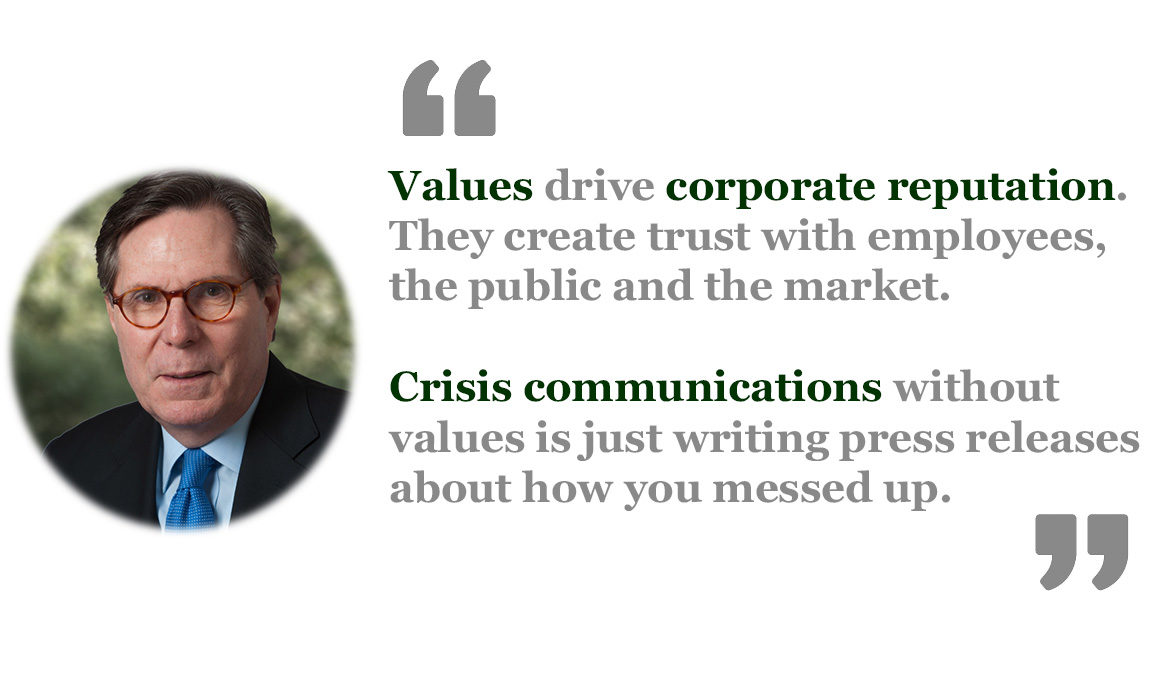
Corporate Crisis Communications
The Resilient Journey Podcast - Featuring Larry Walsh Opens in new windowHawthorn Group’s Vice Chairman Larry Walsh sat down with The Resilient Journey podcast host Mark Hoffman to talk share his insights on how companies can manage crises more effectively and the role corporate values play in a crisis. Listen to the podcast here.
Hoffman: Picture a hallway full of photographs of corporate crises: We might see companies like Peloton with the treadmill crisis, Fox News with advertiser boycotts, Chick-fil-A for their anti-gay LGBTQ sentiments. Facebook might take up a rather long section of the hallway. The fact that we know about all of these incidents is proof that more and more issues are playing out in the public arena, and they can drag a corporation’s reputation down. Why are we seeing so much of this now? Is it social media, the 24-hour news cycle or something else?
Walsh: It’s all of the above and then some. The digitization of communications made communications permanent and retrievable – certainly a gift to the plaintiffs bar. We’ve always approached crisis management under the principle of “What can be known will be known.” Today it’s literally true. In the digital revolution all the intermediaries got broken down. So now everyone in the world can share their opinions with everyone else in the world. I don’t need editors or fact-checkers to get my information out. Shareholders can talk to financial analysts without the company being in the middle of the conversation.
Hoffman: There’s a lot of information and disinformation out there. You can pretty much say whatever is on your mind.
Walsh: That’s something you can’t stop – but you can plan for it. That’s where risk analysis helps; you can identify potential problems and ask, “Do we have a plan of action for things that might be unknown?” Then how you respond is a judgment call: Maybe you choose not to engage in a few tweets within networks that don’t affect the core of your business or your relationships with your employees or customers. If it’s crucial to one of those relationships, you might choose to be very aggressive. The point is, you need to participate in social media but you don’t need to participate with everything.
Hoffman: Some of the crises on our hallway don’t have anything to do with business performance; they’re on the wall because of self-inflicted bad behavior. Is that still something you have to deal with?
Walsh: Whether it’s connected to business performance or not, how a company deals with bad behavior has a direct impact on its performance. An analyst looks at how a company performs against its business plan, then makes a judgment about the individuals running it.
When an accident occurs, the company might put out one story and an observer on the ground might see something very different and mention it. Or if there are other problems that the company has put under the corporate rug, that’s often what makes a difficult problem a crisis, when there is a disconnect between the corporate brand and its behavior.
Hoffman: …and that builds a fact pattern that then becomes discoverable if there’s a lawsuit.
Walsh: From a planning perspective, let’s assume it will become public. In our planning, we may generate a lot of information we never use, but we’ll have had the benefit of thinking through our response and how it relates to our values and how we’re dealing with it over time.
Hoffman: A lot of companies feel like their best approach is to just try to stay under the radar. Maybe they think they’re small enough or maybe they think if they stay quiet the crisis will avoid them. Can that work?
Walsh: Just because you’re small doesn’t mean you’re going to avoid scrutiny. We ask clients, if it showed up in the New York Times, how would you feel about it? And it doesn’t have to be the Times – it could be a blogger, a social media contact, something on Twitter or Facebook. The people who think they can hide their problems are sort of like investors who think they can time the market. It may work out but it certainly raises your risk profile. If you get to that point, you’re not dealing with a business problem any longer, you’re creating a new one.
Hoffman: I like to remind companies facing a crisis to focus on their core messaging and corporate principles. But Hawthorn Group takes this a step further: you say, everything having to do with a crisis is built around the company’s core values. Can you explain that a little more?
Walsh: Values are the foundation of corporate reputation; they are what creates trust with employees, with customers, with the marketplace, with government. A major healthcare company that’s well-known for its positive reputation said they feel it helps them when they are before the FDA during the drug approval stage; their research is taken a little differently than others because the reputation they have is based on values that permeate the organization.
In a crisis, what’s the basis on which you want a manager to make a decision at 3:00 am? It’s got to be the values. You can build a management culture based on values that’s true in different cultures, even when they’re hiring from markets that have very different standards from one another.
We had a client years ago who owned a mill on a river that had a release of a gas used in processing that was near an elementary school. Some 77 children were affected, mostly by coughing. When reporters got to the manager, he didn’t check with corporate, he said, “This was our mistake. If anybody’s harmed, we’re responsible and we will pay all medical bills.” It kind of goes counter to what a lot of us might think might be the right response.
Hoffman: I have clients who tell me, when it comes to something like a data breach, they will “over report” to the regulators to build a good relationship with them. “We want them to know that they can trust us, that we’re going to be proactive in communicating with them.” If they turn around and decide to cover up something down the road, that’s a harder fall, right?
Walsh: Absolutely. That’s why values really should drive everything. A corporate communications plan without corporate values is just writing press releases for things you messed up. Then you’re trying to dig out. That’s what undercuts trust.
In the Ford Pinto crisis, there was a design flaw and, if I remember correctly, rather than say, “We’d better fix this,” Ford conducted a cost-benefit analysis and concluded, “It’s so expensive to make a major design change; it would be less expensive just to leave the product on the market and pay whatever lawsuits come.” When a company’s stated values or the values implied in a trust relationship are undercut, the company suffers enormous damage. That’s why Standard & Poor’s and Berkshire Hathaway consider reputation when they evaluate companies.
Hoffman: How do business leaders who have been through a crisis respond differently from the first to the second time?
Walsh: You need muscle memory. People are better managers when they’ve been through a crisis; they understand where things went wrong. Companies put up a sample crisis, work against it and ask, “How did we do and what could we have done differently?” In a crisis, you need the decision-makers in the right place at the right time so they can sign off on a decision and go back to their day jobs. The last thing you want is the CEO working full-time on the crisis; then you’re likely to create another crisis because you’ve missed something in the interim. Planning and practice are critical to an effective response.
# # #
